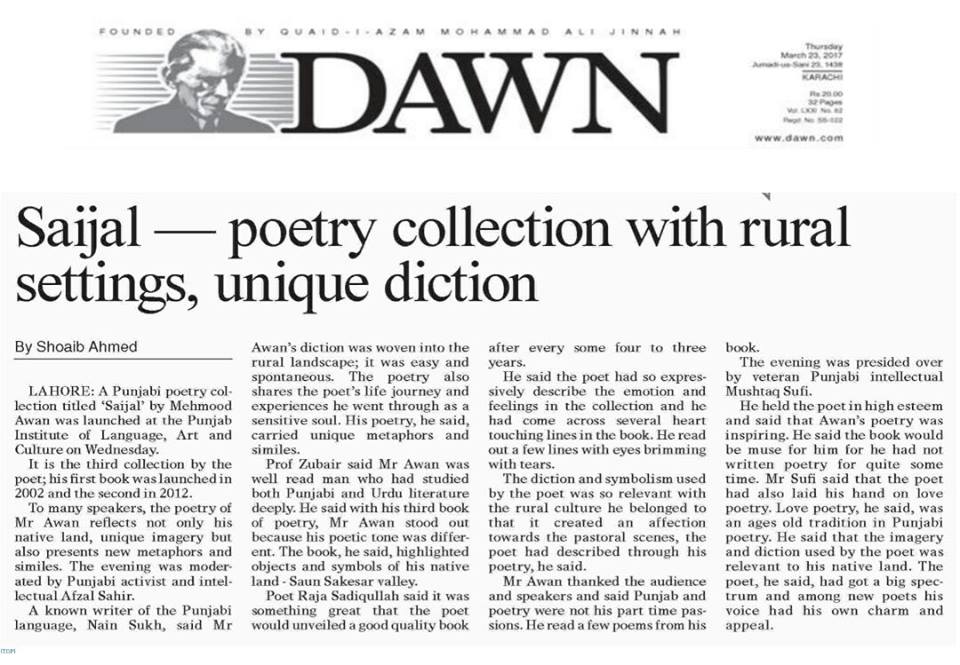Shoaib Ahmed (Published March 23, 2017 in Dawn)
LAHORE: A Punjabi poetry collection titled ‘Saijal’ by Mehmood Awan was launched at the Punjab Institute of Language, Art and Culture on Wednesday.
It is the third collection by the poet; his first book was launched in 2002 and the second in 2012.
To many speakers, the poetry of Mr Awan reflects not only his native land, unique imagery but also presents new metaphors and similes. The evening was moderated by Punjabi activist and intellectual Afzal Sahir.
A known writer of the Punjabi language, Nain Sukh, said Mr Awan’s diction was woven into the rural landscape; it was easy and spontaneous. The poetry also shares the poet’s life journey and experiences he went through as a sensitive soul. His poetry, he said, carried unique metaphors and similes.
Prof Zubair said Mr Awan was well read man who had studied both Punjabi and Urdu literature deeply. He said with his third book of poetry, Mr Awan stood out because his poetic tone was different. The book, he said, highlighted objects and symbols of his native land – Saun Sakesar valley.
Poet Raja Sadiqullah said it was something great that the poet would unveiled a good quality book after every some four to three years.
He said the poet had so expressively describe the emotion and feelings in the collection and he had come across several heart touching lines in the book. He read out a few lines with eyes brimming with tears.
The diction and symbolism used by the poet was so relevant with the rural culture he belonged to that it created an affection towards the pastoral scenes, the poet had described through his poetry, he said.
Mr Awan thanked the audience and speakers and said Punjab and poetry were not his part time passions. He read a few poems from his book.
The evening was presided over by veteran Punjabi intellectual Mushtaq Sufi.
He held the poet in high esteem and said that Awan’s poetry was inspiring. He said the book would be muse for him for he had not written poetry for quite some time. Mr Sufi said that the poet had also laid his hand on love poetry. Love poetry, he said, was an ages old tradition in Punjabi poetry. He said that the imagery and diction used by the poet was relevant to his native land. The poet, he said, had got a big spectrum and among new poets his voice had his own charm and appeal.
Published in Dawn, March 23rd, 2017
https://www.dawn.com/news/1322245
https://www.dawn.com/news/1322245/saijal-poetry-collection-with-rural-settings-unique-diction
Reads of the Year 2025 – Mahmood Awan for The News
by Mahmood Awan | 9 January 2026 | Punjabi Culture & Music, Punjabi Language, Punjabi Poetry, Punjabi Prose, The News on Sunday Write-Ups | 0 Comments
Mahmood Awan shares his reads of the year 2025 for The News on Sunday
Saryaab: A poetic Arrival
by Mahmood Awan | 7 December 2025 | The News on Sunday Write-Ups, Urdu Reviews | 0 Comments
Reads of the Year 2024 – Mahmood Awan for The News
by Mahmood Awan | 29 December 2024 | Punjabi Culture & Music, Punjabi Language, Punjabi Politics, The News on Sunday Write-Ups | 0 Comments
Mahmood Awan reviews his most cherished reads of the year 2024 for The News on Sunday Roundup, 24
Najm Hosain Syed’s Kaafian
by Mahmood Awan | 15 December 2024 | Punjabi Culture & Music, Punjabi Language, Punjabi Poetry, Slider, The News on Sunday Write-Ups | 0 Comments
Mahmood Awan reviews Najm Hosain Syed’s’ Kaafian retitled ‘Aao Raat Jagaa’o’; Translated into English by Naveed Alam and Dr Asma Qadri) in today’s The News on Sunday.
Literary soul of the Punjab: Baramah (2023)
by Mahmood Awan | 20 May 2024 | The News on Sunday Write-Ups | 0 Comments
Mahmood Awan reviews Punjabi magazine ‘BaraMah’ for The News on Sunday
Reads of the Year 2023 – Mahmood Awan for The News
by Mahmood Awan | 25 January 2024 | Punjabi Language, Punjabi Poetry, The News on Sunday Write-Ups | 0 Comments
Sejal: Mahmood Awan’s Songs of Exile
by Mahmood Awan | 28 December 2022 | Punjabi Poetry, Reviews of Awan's Poetry, Slider, The News on Sunday Write-Ups | 0 Comments
In his latest collection of poems Mahmood Awan captures the zeitgeist of present day Punjab
Reads of the Year 2022 – Mahmood Awan for The News
by Mahmood Awan | 25 December 2022 | Punjabi Poetry, The News on Sunday Write-Ups | 0 Comments
As we bid adieu to 2022, TNS turns to South Asian writers and authors to ask them about the titles they read this year that have stayed with them. Here, in alphabetical order, is what they say – TNS
Zubair’s Grieving for Pigeons
by Mahmood Awan | 18 December 2022 | Punjabi Fiction, Punjabi Language, The News on Sunday Write-Ups | 0 Comments
The first book-length translation of Zubair Ahmad’s Punjabi short stories
A Year in Reading: 2021
by Mahmood Awan | 26 December 2021 | Punjabi Poetry, The News on Sunday Write-Ups | 0 Comments
As we approach the end of 2021, we ask some of our favourite writers to share what they enjoyed reading all of last year. Here, in alphabetical order, is what they say – TNS

